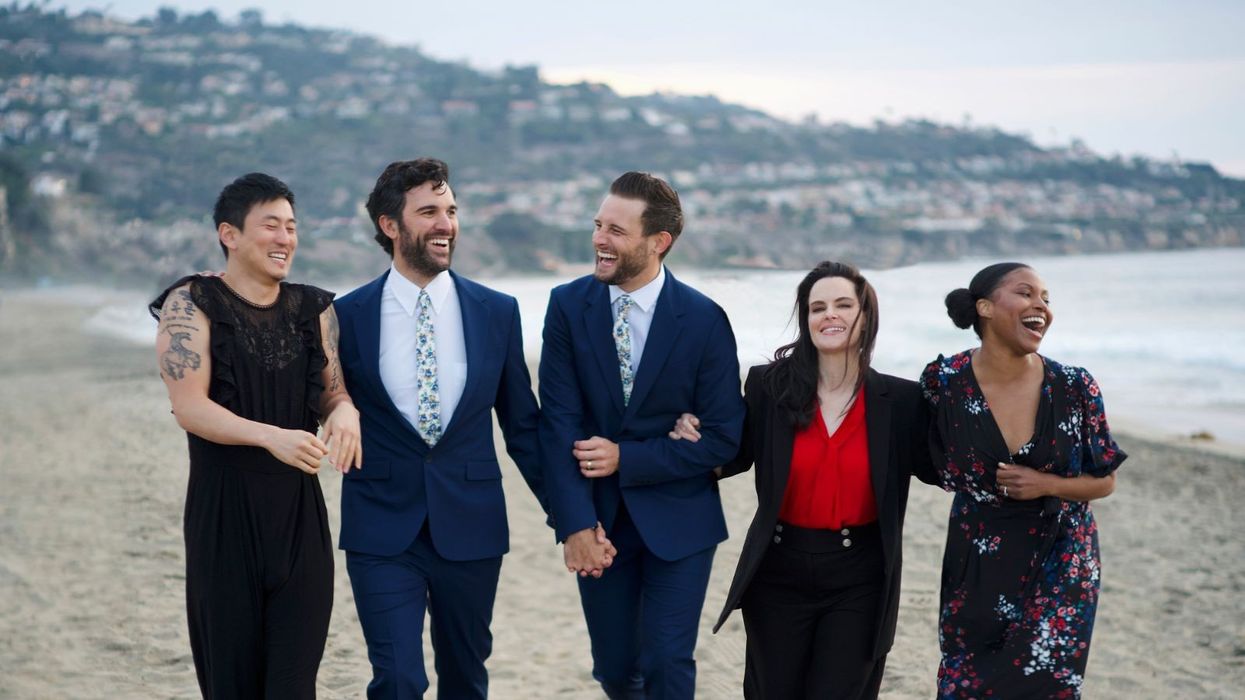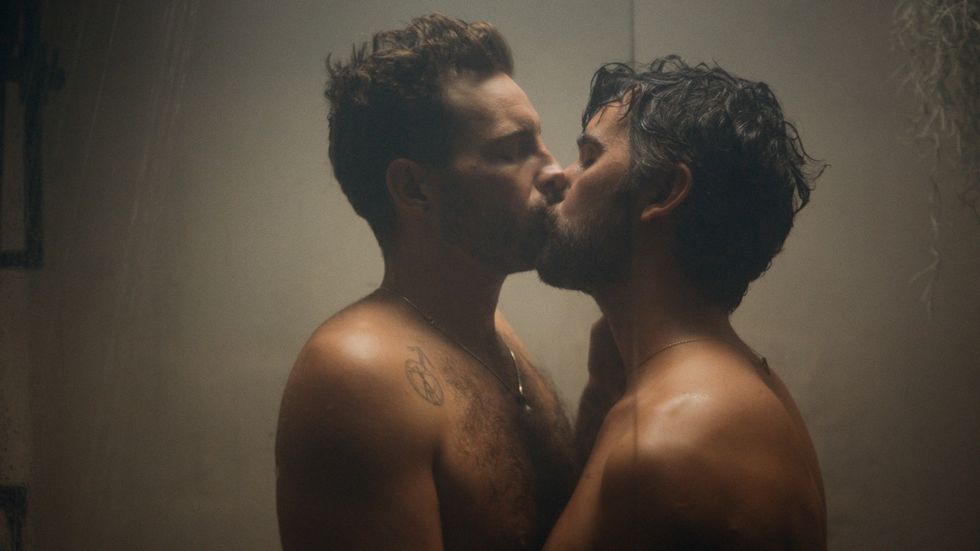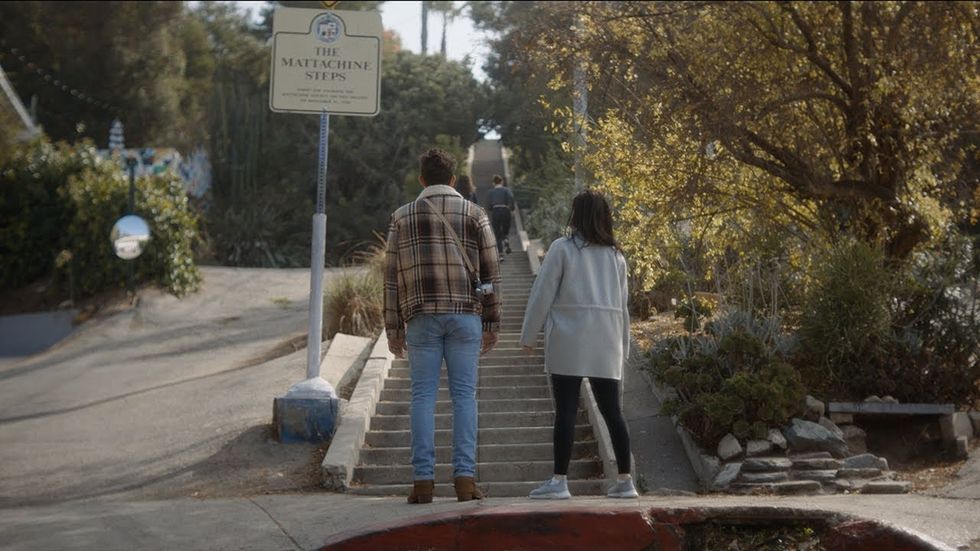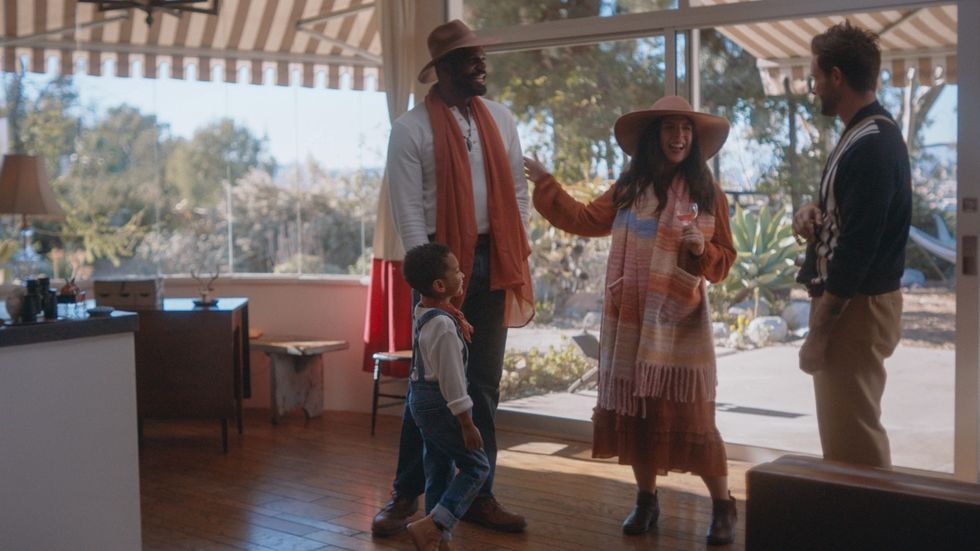How To Trust the Production Process With ‘The Mattachine Family’ Writer and Director
Filmmaker duo Andy and Danny Vallentine talk with No Film School about their first feature film, The Mattachine Family.

'The Mattachine Family'
THE MATTACHINE FAMILY (Clip) - Frameline47
Editor's Note: This interview has been edited for length and clarity.
No Film School: Congratulations on this film being out there on the film festival circuit for everyone to watch. It's an incredibly special film, and I hope everyone that gets to see it does see it. I'm really curious of what was the inspiration behind the story and how did you begin talking about making it a feature-length project?
Andy Vallentine: Danny's always been a writer, and I've always been a director. We've been married for almost 10 years, and our creative relationship didn't really start until like five years ago when we've been in the industry a while and wanted to try to do something together. They always say for your first film, you know, indie film, try to do something personal, try to do something where you're the expert on it. We looked through our lives and we realized that some of the more contentious moments in our relationship are when we're [thinking] what does our future look like together? Do we want kids? Do we not want kids? What's that like?
Danny Vallentine: For me, I looked at these discussions, and can it be such a powerful way to understand your own life. I began looking around for films that kind of depicted what we were going through or to help me answer the questions that we were coming up with. I didn't really see anything. There are a ton of films about queer women who are parents, but there wasn't really a lot about men who become parents. As a way to kind of answer these questions and maybe fill a void that we recognized, we began writing it as a film. A lot of the film is taken from stuff that we talked about and, and Thomas's journey of exploring, fostering, adopting, and talking to people about surrogacy. All those things were pulled from our lives and like conversations that we had with our friends and who were making families. A ton of us just pulled from our actual life and, and, and regurgitated into a film. But one thing I really loved and appreciated about this film is that you are really taking the time to look at the different types of queer family dynamics that exist. I really like the idea of presenting a space where everyone can be, instead of just focusing on one specific type of dynamic. Was that always the goal, or did that just organically happen as you start writing?
It organically happened because we have friends who fostered, we have friends who adopted, we have friends who used sperm donors to have their own child, and we had friends who did surrogacy. It's nice, the movie's not an exact replica of our lives, obviously, but it is reflected back into the film, like things that we were, questions I was having about what options are available to us. Questions about what it means to be a queer parent and what it means to make a family and what about taking what's been important in the past, this idea of chosen family, and meshing that with these new opportunities that are arriving in the future. How we pull from the past what was great and then move into the future and make a, you know, present out of that.
This is the interesting thing when you know it's not for everybody. A lot of straight couples when they decide to have children, it's like, great, we're gonna have children. Then they go and they have children and, obviously, there can be hiccups along the way, but for queer people, there's a little bit more discussion there. It's like, "OK, well let's have children. Well, how do you wanna have children? Like, there are different paths to that." We definitely set, uh, Thomas, Nico [Tortorella's] character, on that journey of seeing all the different ways that queer people could have children. When he met Annie [Funke] and her relationship, their ex their own experiences with fostering and, and Oscar's experience with fostering. We wanted that journey for queer people to explore.

'The Mattachine Family'
Courtesy of Outfest Film Festival
NFS: Another thing I enjoyed about this was the narrative structure. There were your classic narrative moments and then this voiceover, insert style. Did this structure exist during the writing process?
Danny Vallentine: We call them narrative narrated sequences. They were present from the beginning. It was at some point that I arrived at the decision that Thomas was gonna be a photographer. I was thinking about ways that we can incorporate photography into the film that just kind of naturally occurred as a way if we could see Thomas as someone who's always watching, who's kind of like, so it arrived at like, okay, well we'll use the photographs and we'll talk about kind of what Thomas is thinking about what's happening in his life, what happened in his past, how he connects to his friends and his family through photographs.NFS: I know you worked with Sean Cook during this whole entire process of creating the photos. What was it like working with him, uh, to create these beautiful images for the film?
Danny Vallentine: Sean was my college roommate at Michigan State.
Andy Vallentine: Sean is a beautiful wedding photographer in the Midwest. He shot our one when we got married. When we got married, we did a destination wedding in Paris, and he came with us and shot our wedding. He shot all my siblings' weddings. When I was thinking about Thomas's eye, I didn't want it to be mine. I share my eye with Julia [Swain], my cinematographer. I didn't want our eyes to be Thomas's eyes. I wanted somebody else to come in and take unique photos and set up those little moments themselves, and create something new that felt different.
I think Sean was there for six days of production, and we shot all of those photos over the course of six days. It was a logistical challenge to be able to be shooting a scene in one room and then have him shoot photos in a different room. I was really happy with, uh, all of the photos that he got and was just like so excited that somebody that's been in our lives for 23 years, that he was able to come and participate in it was a great experience.
NFS: It truly is like a whole family production. How long was principal photography for the film?
Andy Vallentine: It was 20 days, and one pick-up day in New York where we shot like that running montage with Nico. I feel like most indies are like 15 to 25 days. We were more in the middle there. It was definitely like a challenge. It was not easy to go in ... I think as a filmmaker, it's like we have our eyes set on these big ideas and part of filmmaking is always compromising with what you have on the table and what tools are available at the moment. There were some days when I was only shooting three pages a day and captured everything exactly how I had imagined and pictured in my head and get every performance that I wanted. Then there were other days where it was like we were shooting 10 pages that day. It was more about getting in there and getting our coverage for the day because that's what our budget allowed.
NFS: It always is. It's not easy.
Andy Vallentine: That's true. I'm sure there are plenty of films, and other filmmakers that you talk to that have millions and millions of dollars probably say a similar thing. It's because I feel the same when I do like a lower budget commercial as when I do like a higher sense of commercial. There are new challenges in all of those.

'The Mattachine Family'
Courtesy of Outfest Film Festival
NFS: Speaking of challenges for both of you, uh, in either the writing process or when you're behind the camera, what was one challenge that you weren't expecting that did happen and how did you overcome that issue?
Danny Vallentine: We had done a short film together, but kind of all my other writing I've done before this had been kind of theoretical like you could write whatever you wanted without having to think about having to think about the logistics of making it happen within the constraints of a budget and a timeframe and a production. The process of writing the script was kind of like, you wrote your dream version of like what the story would be, then the process of like sitting down with Andy and having to go through scenes and be like, "Okay, this is no longer realistic, let's write something else, was a challenge."
It was difficult for me at first to let go of things that I felt connected to. Overall, we learned to collaborate and cooperate and I learned to let things go. That's such an important process for a writer. Learning how to kill your darlings, and being able to write yourself out of a problem is the ultimate goal of a writer. That was kind of unexpected. I had never really followed the writing process through to the end and think about at some point, you're going to have to change things beyond what your ideal version of it and arrive at something that probably is ultimately better once you collaborate with the actors' ideas or the director on his ideas.
Andy Vallentine: I think that the more logistical challenge was that there was a scene that Danny had written where Oscar was supposed to have this big Airbnb, which was this beautiful mansion in Michigan. We were planning on actually going to this mansion, and filming in this beautiful home and we were gonna go to Arrowhead to do it. Then, probably like a week before, it was like, "Okay, well that's not gonna happen anymore due to the budget. We've gotta cut that, we can't travel." So we shifted it to like this motel in Los Feliz [a neighborhood in Los Angeles, California], and we were trapped in this motel.
As a filmmaker, it was a challenge because I went from this idea of this shooting in this big house and these elaborate shots where we were supposed to be traveling all over this house and as they were having this argument. Instead, I was trapped in a room. We were able to make something. There were some script modifications that needed to come from that, but we were able to make kind of something super compelling, even if it was just taking place in one room. I like to give credit to Nico Tortorella and Juan Pablo Di Pace for being able to keep the audience's attention, you know, for seven minutes. That scene keeps me on edge and the audience on edge or hopefully keeps the audience on edge. I am limited as a filmmaker. My camera can't go around so many different ways. To shoot six, seven pages, or eight pages in one day was a challenge.
NFS: In those challenging moments, how do you two lean on each other for creative support to get through those barriers that you have when you're deleting your darlings?
Andy Vallentine: I feel like we both ... well, it's hard because we've been together so long. We've been married for almost 10 years and together for almost 14 years. We know each other so well. When there's a problem, we both tend to spiral.
Danny Vallentine: I don't agree with that. I think that you're--Andy Vallentine: I just, I spiral off you.
Danny Vallentine: I think that for me, Andy's like a calm setting presence in filmmaking. I feel like he's so experienced with being on set that the things that I perceive as being big deals are not to him. His common steadiness helps me in the moment of crisis. You [Andy] would be like, "Oh, we're not gonna get this. Or the sun's going down," I'd be like, "Oh my God, the sun's going down. We're not gonna get the shot." And you'd be like, "All right, we're just gonna move fast."
Andy Vallentine: Well I was like, "We'll color it, it's fine. We'll make it match." But that's so interesting because I feel like those sorts of problems on the set sun's going down, I have to make a thousand decisions a day to make as a director and I hope that like 95 percent of them are correct. It is what it is.
There was a moment where "Moon River" plays multiple times throughout the film--our song that we danced at our wedding--and there was a long discussion with the people who own the license and the publisher about getting those rights and Jennifer Baron, our music supervisor, worked tirelessly to get that. But that was a moment where I remember going to Danny and saying, "We're not getting "Moon River" because it's out of our budget." I think that you [Danny] were really upset about it and that made me more upset about it because I knew it was important for us to have that in the movie. Then we went back to Jennifer and I was like, "Please, can--
Danny Vallentine: But again, you were pragmatic.
Andy Vallentine: I was, but I guess I like spiraled because I knew that there are things you do in indie films that you hope that the audience brings a little bit of their baggage with them as they're watching. So "Moon River" is a song that most people know, most people have some sort of emotional connection to it. I'm using that as a device to try to hook the audience in and like get them to relate to my characters through that song. I wanted it as well. It was important to us, but I also wanted that song to help in our narrative process.
But that's so interesting. At some point, too, in our relationship, the writer hands off the project to the director, so like I am the one who is responsible for executing your vision. So when I see that you're disappointed or something, I wanna make sure to do this. Sorry, I feel like this turns into a therapy session.
NFS: No, it's so sweet. It's, it's this beautiful thing because yes, you are partners in life, but it's like you are, you trust each other so much to be creative partners and that's a really hard thing to do is trust yourself to be vulnerable in your creativity.
Andy Vallentine: Thanks for our free therapy session.

'The Mattachine Family'
Courtesy of Outfest Film Festival
NFS: Do you have any advice for anybody who wants to be a writer or a director or create their first project with somebody they really trust as well?
Danny Vallentine: I've written a few other screenplays before, but this one was the one that was the most personal to us. If I were to give someone advice, I'd say to find a story that has to be the one that you have to tell it. Other people probably could have told this story, but this is the one I felt like if someone was gonna tell this story, it should be me and it should be us. When people read the script, what they responded to was that it was like a story that was really important to us. Because of that, it touched other people.
If you write something that has to be the story that you have to tell, people are gonna recognize that and people are gonna respond to it.
Andy Vallentine: Advice I would have is to keep making stuff. While this is our first feature, we still had like collaborated on little things throughout our entire time of being together, whether it was like Danny was helping me write other projects or whatever it might be. Just keep working. If you have a creative partner, even if its something small, just try it. The same goes for filmmakers as well. Only recently have I directed a movie the before this. I started 12 years ago and it was me doing everything. I was, I was the camera operator, I was the sound, the boom operator, I was everything for all of my little shorts. It takes a really long time to get here. Sometimes we forget that because we see some people who get lucky when they're younger and they get this incredible opportunity, and we all kind of aspire to be that person. But for the majority of film directors, it doesn't start until later in life because you really have to establish yourself within your community and the people with that you can tell stories and show that you can put emotion on the screen.
Also, you can establish relationships with other filmmakers and other crew members. Try to be positive in this world. That is my takeaway. At some point, I do remember that I would get really stressed or I would be rude on set 15 years ago when I was in college and I had to make that change at some point. Everybody's here to help. We're one of the lucky people that get to pursue our passion for making films. We have to look at it that way and try to be positive.
NFS: Is there anything else you'd like to talk about?
Andy Vallentine: People can follow our Instagram, at Mattachine Family. We've been accepted into 15 other film festivals, which is exciting. All of those announcements will be made in the next few weeks and hopefully, there'll be more film festivals.

 Richard Gere and Uma Thurman in 'Oh, Canada' via Kino Lorber
Richard Gere and Uma Thurman in 'Oh, Canada' via Kino Lorber  Uma Thurman in 'Oh, Canada'via Kino Lorber
Uma Thurman in 'Oh, Canada'via Kino Lorber 









